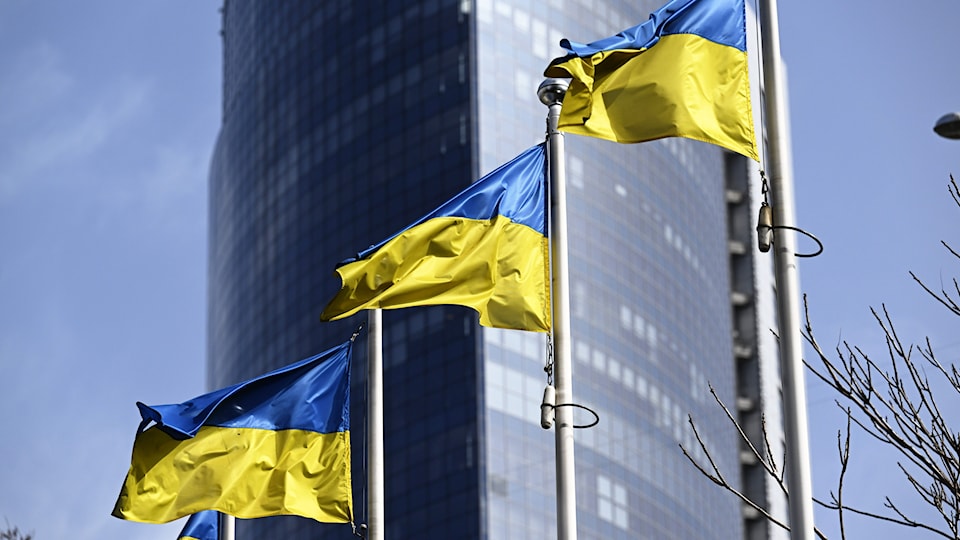The European Council has approved the use of profits from seized Russian Central Banks assets to fund military support to Ukraine and aid in reconstruction. However, experts say that decisions about assets will be crucial in order to ensure that the council's decision isn't performative.
In a press release on May 21, the European Council said the profits of Russian assets held in central securities depositories (CSDs) will be paid to the European Union (EU) on a bi-annual basis.
The vast majority, 90 per cent, will be used to provide military support to Ukraine through the European Peace Facility, according to the release.
The remaining 10 per cent will be used to support Ukraine’s defence industry capacities and reconstruction needs, according to the release.
"CSDs will be allowed to provisionally retain a share of around 10% of the financial contribution to comply with statutory capital and risk management requirements," the statement read.
Arne Kislenko, a professor of history at Toronto Metropolitan University, said this action is a very demonstrative act on behalf of the EU, but that timing is essential.
"So, the assets of 20 billion, isn't anything to sneeze at," Kislenko said. "It's certainly a sizeable amount of money, but it really depends how quickly it can get into circulation and exactly what that's going to buy in terms of assets."
Other experts disagree.
Director of the Russia and Eurasia Programme, James Nixey, at London-based think tank Chatham House wrote an article that said that before reconstruction can begin, the war needs to end. Ukraine has war costs of around $50 billion U.S. dollars.
Nixey said that the few billion dollars in interest payments being sent to Ukraine will amount to little.
"Seen in these terms, the EU’s proposal to confiscate and repurpose only the $3-5 billion in interest generated by the $300 billion every year, cannot be considered a meaningful amount," Nixey wrote.
The EU Commission states the actual number is approximately EUR 300 billion.
Creon Butler, director of the Global Economy and Finance Programme at Chatham House, warned in an article published to the site that the seizure of frozen Russian assets could have a chilling effect on countries like China and Saudi Arabia keeping their foreign reserves in euros or dollars.
Russian assets of around EUR 300 billion are frozen in Europe, according to a Council of Europe statement from 2022. These assets were frozen following Russia's invasion on Ukraine on Feb. 24, 2022.
These assets are held in central securities depositories (CSDs) in Europe. The majority of Russian assets in the continent are held by Belgian company Euroclear.
Euroclear holds around 70% of all Russian assets frozen in the West, with a value equivalent to around EUR 190 billion according to a report by The Economist.
The profits on EUR 300 billion run up into the billions.
Euroclear reported financial results for 2023, with net interest earnings amounted to EUR 5.5 billion, of which EUR 4.4 billion relate to interests linked to Russian sanctions.
The Royal Canadian Mounted Police (RCMP) reported in 2022 that it had frozen over CAD 123 million in Russian assets and blocked nearly CAD 290 million in transactions with Russian entities.
Estimates of the reconstruction costs for Ukraine vary, with a range of between $500 billion to $1 trillion U.S. dollars.
Kislenko said the delay in making this decision was a consequence of thinking about a post-war scenario.
"Ultimately people are thinking about a post war scenario where Russia, whether we like it or not, will to some degree need to be rehabilitated," he said. "We'll be drawn in to a future diplomatic order and in that light these kind of decisions can come back and bite you. So I think that would explain in part the delay in deciding what to do."
German Minister for Foreign Affairs Annalena Baerbock, in Kyiv to meet with Ukrainian President Volodymyr Zelenskyy, said in a press release from the ministry that Ukraine urgently needs more air defence to defend against Russian missiles and drones and announced additional support.
"That's why I have launched a global initiative for more air defense together with Defense Minister Pistorius," Baerbock said in the release. "Almost one billion euros have now been collected to provide additional support for the Ukrainian air defense forces, and we are working intensively to make this even more."



